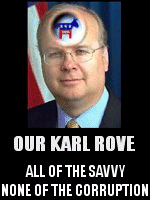Democrats running for office,
Much hoopla has been created in Democratic circles over a report that Republicans plan on getting personal in their campaigns this fall. Opposition research, finding character flaws, and even exaggerating facts to cast Democrats as bad alternatives...all in an effort to win their races.
The very fact that Democrats are shaken and/or surprised by such "news" -- and the very fact that this article needed to be written at all -- is an indicator that Democrats have not fully digested a very fundamental paradigm:
Running for office has precious little in common with being in office.
Yes, this seems very obvious when you read it. But, it appears that many Democrats to this day still believe that running a campaign is more akin to giving voters a "preview" of what they would do in office, rather than treating campaigns as a completely different process, with completely different goals and objectives. So at the risk of being rudimentary, I submit the following primer:
Running for office is a public relations exercise. Your primary goal is to be popular enough to get the most votes (and interesting enough to get people to actually come out and vote). That's it! If your positions on the issues help you become more popular with voters, great -- use your positions. But if you have a position is not going to be popular, then you need to shift your message to things that will be popular: your character, values, history, family, successes... whatever topics you can toss into the ring that will help you win more votes and get people excited about you representing them.
Being in office, on the other hand, is about communicating and setting policy and being clear about your positions, and how they link into your vision for your district/state/nation. While public relations plays a part in being in office, it is merely a component of the job. But the policy-related issues and strategies you'll be setting while in office are purely optional things to talk about when you're running for office. So carefully pick and choose the issues you choose to share with voters to ensure you are the most popular.
If we agree on this delineation, then it's clear that Republicans are generally more in touch with -- and fundamentally understand -- the political process. Because Republicans are no longer popular with voters, their top job in campaign mode is to shift the focus onto things that make them more popular than you. And exaggerations, white lies, and misleading information are part of the public relations process: unless there's a law against it, it's fair game.
So when you're attacked by your opponent, it is your responsibility as a candidate to diffuse and deflect any and all accusations (true or not) levied against you in such a way as not to reduce your popularity with voters. Then, immediately refocus the campaign back onto the things that will make you more popular... which right now would be your discontent with the Iraq War and, by extension, the entire Republican approach to governing.
This political season, the Iraq War does seem to be ground zero for popular discontent with voters. And, being the rugged Americans we are, we seemed to have dug our collective heels in on this issue, and have submitted our verdict: it's a flop. Represent this view in your campaign, and it's more likely that people will want you to represent them.

2 comments:
I agree with you, but I think the emphasis of effort should be slightly different. When attacked, their Karl Rove goes on the offensive. The lesson of both the last two presidential campaigns is that Rove attacks his opponent, and specifically attacks their strength, not their weakness (think swift boats). Insofar as the war is the republican weakness, this is where (and why) our efforts should be directed.
Maybe more "Democrats" would read your blog if you used proper grammar. For example, in your blog heading you say, "If Karl Rove was a Democrat..." Please try again: if and were go together. Therefore, if Karl Rove were a Democrat...
Post a Comment